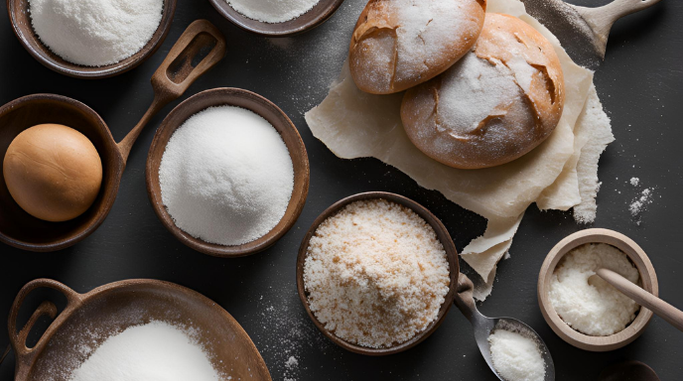When it comes to baking, salt may seem like a simple, almost invisible ingredient. Yet, it is essential to the success of many baked goods, playing far more roles than just adding flavor. From enhancing sweetness to controlling yeast activity, salt is integral to the chemical and physical processes that make baked goods rise, taste better, and hold their structure. Here’s why salt is so important in baking.
1. Enhances and Balances Flavors
The most immediate role of salt in baking is its ability to enhance flavors. A pinch of salt in cookies, cakes, or bread can elevate the overall taste by balancing sweetness and reducing bitterness. Salt has the ability to suppress bitterness in ingredients like cocoa powder, dark chocolate, or certain fruits. Without it, sweet baked goods can taste one-dimensional or overly sweet.
In addition, salt helps to bring out the natural flavors of other ingredients. For example, a small amount of salt in a vanilla cake recipe can amplify the vanilla flavor, making it taste more vibrant and complex. It’s a flavor enhancer, not just a seasoning.
2. Regulates Yeast Activity
Salt plays a critical role in regulating yeast activity in bread and other yeast-leavened products. Yeast is responsible for fermentation, which causes dough to rise, but it can be unpredictable. Too much yeast activity can cause the dough to overproof, leading to overly airy or uneven textures.
Salt slows down the fermentation process, allowing the dough to rise slowly and steadily. This controlled fermentation results in a more even texture, better flavor, and a more cohesive crumb in the final baked product. Additionally, salt strengthens the gluten network in bread, which contributes to its structure and chewiness.
Without salt, yeast may become too active, resulting in dough that rises too quickly or unevenly. Salt’s ability to control the fermentation process is one reason why bread recipes without salt can result in a poor texture and overly yeasty flavor.
3. Strengthens Gluten Structure
In bread baking, salt is essential for gluten development. Gluten is the protein network formed when water interacts with wheat flour, and it provides the dough with elasticity and structure. Salt strengthens this gluten network, improving the dough’s ability to hold gas during fermentation and resulting in a better rise.
The elasticity provided by salt helps bread dough to expand during baking without collapsing. It also helps the dough to hold its shape as it rises, preventing it from becoming too loose or slack. For these reasons, salt is key in recipes for yeast-leavened bread, pizza dough, and bagels, where structure is particularly important.
4. Improves Texture and Crust Development
Salt also affects the texture and appearance of the finished product. In bread, it helps create a crisp, flavorful crust by regulating the dough’s fermentation. This results in a more evenly colored and crispy crust, which is one of the defining characteristics of good artisanal bread. Salt also prevents the dough from becoming too sticky, making it easier to handle.
In cakes and cookies, salt can contribute to a tender texture by balancing the interactions between flour, fat, and liquid. It helps create the right balance of moisture, fat, and structure, resulting in baked goods that are neither too dense nor too crumbly.
5. Controls Fermentation Rate in Sourdough
In sourdough bread, salt is an even more important ingredient for controlling the rate of fermentation. Sourdough starters rely on wild yeast and bacteria to ferment the dough, and salt helps to regulate the growth of these microorganisms. It prevents the dough from fermenting too quickly or becoming too sour. This gives the baker greater control over the rise and flavor of the sourdough.
Without salt, sourdough bread may over-ferment, leading to an unpleasantly sour taste or poor texture. Salt is particularly important in sourdough because it helps balance the acidity created by the fermentation process, resulting in a more harmonious flavor profile.
6. Acts as a Preservative
Salt helps to preserve baked goods, particularly in recipes like bread and cakes. By slowing down the growth of microorganisms and regulating the fermentation process, salt helps extend the shelf life of baked goods. For example, bread made without salt may stale or spoil more quickly.
In addition, salt can help prevent the growth of mold in baked goods. This is especially important in recipes where moisture is present, such as cakes, muffins, and certain sweet breads.
7. Increases Maillard Reaction
The Maillard reaction is a chemical process that occurs during baking, contributing to the browning of crusts and the development of complex flavors. Salt plays a role in enhancing this reaction, helping to produce that desirable golden-brown color and deeper flavor in products like cookies, bread, and pastries. The Maillard reaction is essential for creating that crispy, flavorful crust on bread and the golden-brown edges of cookies.
8. Regulates Sweetness in Sweet Baked Goods
Salt is essential for making sweet treats taste their best. It’s a known fact that a small amount of salt can balance out sweetness in recipes. In cakes, cookies, and brownies, adding salt helps temper the sugary flavor and make the sweetness more nuanced and enjoyable. Salt enhances the sweetness without overpowering it.
In fact, many of the best chocolate chip cookie recipes call for a small amount of salt because it enhances the chocolate’s rich flavor and balances the sweetness of the dough. This principle applies to many other types of sweets, where the salt amplifies the overall flavor experience.
9. Prevents Over-Development of Gluten in Shortbread and Pastry Doughs
For doughs where tenderness is key—such as shortbread, puff pastry, or pie crust—salt helps control the development of gluten. These types of dough benefit from minimal gluten development, which is achieved by controlling the amount of time the dough is handled and by ensuring the gluten doesn’t overdevelop. The presence of salt helps prevent the dough from becoming too tough or elastic, resulting in a more delicate and crumbly texture.
Conclusion
Salt may seem like a small, simple ingredient, but its role in baking is far from insignificant. From enhancing flavor to controlling yeast, strengthening gluten, and improving texture, salt is essential to the chemistry and success of many baked goods. Whether you’re baking bread, cookies, cakes, or pastries, understanding the importance of salt—and using it in the right amounts—can make the difference between a mediocre batch and one that’s truly exceptional. So next time you bake, remember that salt isn’t just a seasoning; it’s a crucial ingredient for flavor, texture, and structure.




